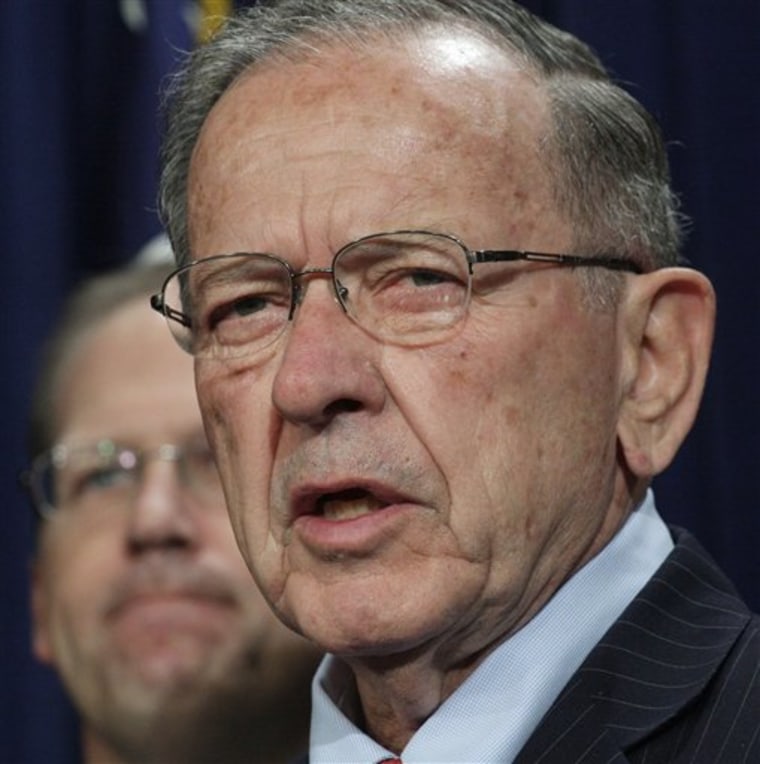The demise of the bridge to nowhere notwithstanding, Sen. Ted Stevens and other Republicans remain the kings of pork-barrel spending, proving that GOP mastery of "earmarks" can withstand public scorn, a president's rebuke and even a Democratic takeover of Congress.
The Senate's two biggest sponsors of this year's pet spending projects are Republicans Stevens of Alaska and Thad Cochran of Mississippi, according to preliminary reviews of fiscal 2008 spending bills by Taxpayers for Common Sense, a nonpartisan group. Two of the House's three biggest claimants of earmarks also are Republicans: Bill Young of Florida and Jerry Lewis of California, the group found.
Their continued success at steering billions of taxpayer dollars to their constituents is all the more impressive— or arguably hypocritical —since President Bush and other prominent Republicans sharpened their criticisms of earmarks after Democrats took over the House and Senate majorities in January.
It underscores the cozy and murky nature of appropriating, in which longtime friendships and mutual back-scratching seem to trump the steely partisanship seen elsewhere in Congress. It also reflects Democrats' calculation that there is political safety in granting the GOP about 40 percent of all earmark spending —the same proportion Democrats enjoyed when they were in the minority — rather than appear vengeful and antagonistic by cutting the Republicans' share more deeply.
"It kind of takes the sting out of their accusations if they are taking 40 percent of the pie," said one House Democratic aide.
Voters criticize but crave projects
Most of all, the continued enthusiasm for earmarks by some of Congress' most senior members proves that voters crave the health clinics, community centers and thousands of other projects that earmarks fund — even if they criticize the practice in the abstract.
Elected officials reflect the public's ambivalence, often denouncing earmarks before enacting them into law. Last month in Indiana, President Bush ridiculed a labor-health-education spending bill, which he vetoed, because it contained "wasteful projects" such as a prison museum, sailing school and "Portuguese as a second language" program. "Congress needs to cut out that pork," Bush said.
But the museum and Portuguese earmarks remained in the sprawling "omnibus" bill, which Bush signaled Thursday he will sign despite his misgivings.
Congressional leaders "have not made enough progress" in curbing earmarks, Bush said at a news conference. He said his budget director will "review options for dealing with the wasteful spending in the omnibus bill."
Democrats this year shed more light on the earmarking process and reduced its overall cost. Still, about 9,000 earmarks costing $7.4 billion found their way into the final spending measure.
Stevens and Cochran retain their earmarking clout even in the minority. Cochran sponsored $773 million in current earmarks, while Stevens claimed $502 million, according to the Taxpayers for Common Sense unofficial tally. Both of them outdistanced Sen. Robert Byrd, D-W.Va., perhaps the Senate's most legendary master of pork-barrel politics.
Veteran legislators who understand the process
Lawmakers said Stevens and Cochran outpaced all other senators because Democrats tend to spread their share of earmarks more widely than do Republicans. Senate Majority Leader Harry Reid, D-Nev., said in an interview Wednesday he was not surprised by Cochran's and Stevens' haul.
"They are both very veteran legislators" and longtime members of the Appropriations Committee, Reid said. "I would assume people in the top seniority bracket would be able to understand the process a little better and do well for themselves."
Stevens, 84, has funneled billions of dollars to Alaska over the years, winning loyalty from voters, scorn from editorial pages and scrutiny from federal prosecutors. He is perhaps best known for defending a colleague's $398 million project, dubbed "the bridge to nowhere" because it served a remote Alaskan island. State officials eventually decided the bridge really was going nowhere, officially abandoning the project in September.
Among this year's Stevens earmarks is nearly $3.5 million for the Alaska SeaLife Center, one of his favorite projects. Federal investigators are looking into the center's activities, which have included purchases of land that belonged to a company owned by a former Stevens Senate aide.
Stevens spokesman Aaron Saunders declined to address the Sealife Center earmark specifically. But he said Stevens is proud to have steered federal help to his sprawling state, where travel is especially difficult.
"He has obviously demonstrated how unique Alaska's needs are," Saunders said, "and Congress has responded."
Whereas Stevens is brash and combative, Cochran is quiet and courtly — but no less effective in shipping billions of public dollars to his lightly populated state.
In transportation legislation alone this year, Cochran inserted nearly $10 million in earmarks for a half dozen Mississippi airports, plus $8 million for bus, highway and other projects.
Such projects may be worthy, critics say, but they should compete for funds on an impartial basis that considers the needs and merits of every U.S. community equally.
Sen. John McCain, R-Ariz., said lawmakers could not possibly know what they were approving in the hastily completed spending bill, packed with "unnecessary, wasteful, run-of-the-mill pork barrel projects" amounting to "a slush fund for the appropriators."
In a lengthy statement submitted for the Congressional Record this week, McCain warned: "It will be a long time before all of the hidden provisions in this legislation are exposed."
